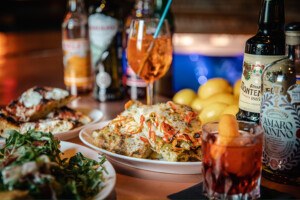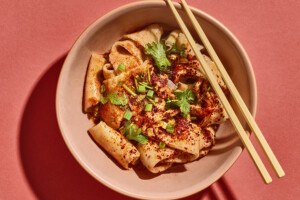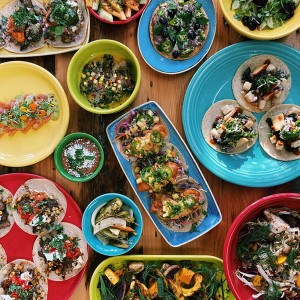Behind the Mask of the Phantom Gourmet
For the past 27 years, Phantom Gourmet has portrayed itself as the friendly pied piper of comfort food in the suburbs. But what if it was just a disguise?

Illustration by Comrade
Like all great performers, brothers Dan and Dave Andelman have a keen understanding that the show must go on. So one day in late March, as COVID-19 cases surged and shutdown hysteria swelled, the cohosts of the TV show Phantom Gourmet calmly stood 6 feet apart at opposite ends of a folding table in a large field ogling a spread of overstuffed whoopie pies. That wasn’t the only kind of pie they were crushing on that day—they also had a lot to say about Harrows Chicken Pies in Reading. But most of all, these two familiar faces—Dave, with his hair slicked back and oozing his smooth-talking swagger, and Dan, flashing a broad grin that highlighted the recent dawning of a pandemic beard—were there to remind viewers in this unfamiliar time how important it was to support local restaurants.
The episode marked the first of several Phantom Gourmet “takeout specials,” tweaked for an audience who could no longer dine out and for a pair of TV celebrities who could no longer work in their Allston studio. With dining rooms dark, cooks jobless, and the entire food economy in free fall, when the iconic purple logo lit up the screen that Sunday, a form of comfort food for locals’ souls beamed out across the state.
If there was anyone who could find a way to keep broadcasting through the apocalypse, it was the Andelmans. Phantom had remained on TV for nearly 30 years, surviving the various convulsions in food media, the rise of streaming, and two recessions. Through it all, the brothers bouncily explained to legions of loyal viewers where to find everything from barbecue pork nachos drenched in melted cheese to overflowing banana-split milkshakes. Their hyperbolic assessments—most everything was either mouthwatering, outrageous, or ooey-gooey—and their sheer love of local food made Phantom Gourmet’s weekend programming not just a ritual, but an idiosyncratic Masshole institution entirely our own.
By the end of March, it seemed all but certain that the brothers would be our corona-era cheerleaders. In one promotional spot for the show, filmed al fresco with just some bare-limbed trees and brush as a backdrop, Dan says to the camera, “Be safe, eat well,” while sporting a COVID-casual black-and-red hoodie from Saugus’s Kowloon restaurant. “We’ll get through this together.”
Three months later, though, it was apparent that the Phantom would not, in fact, be helping TV viewers at home get through anything. Over the course of 10 days in June, Dave, the company’s CEO, shocked viewers by publishing a series of tasteless, tone-deaf jokes on social media about Black Lives Matter protesters that many considered racist. In the rapid backlash that followed, angry fans flooded the show’s station with phone calls, protesters gathered outside a Phantom-owned drive-in movie theater, and restaurants disavowed the program they’d happily partnered with for years. Under pressure, and in a thicket of horrifically bad press, parent broadcaster WBZ put Phantom Gourmet on indefinite hiatus and Dave, the man who was once synonymous with the show, stepped down from his position in disgrace. In the moment when Massachusetts restaurants most needed it, the Phantom was dead.
To anyone just tuning in, the idea that the CEO of a TV show highlighting the best Fluffernutter bagels would write combative Facebook rants about social justice probably seemed like a head-scratcher. At the very least, wouldn’t assuming the mantra “Food and fun, that’s all we serve!” inoculate Dave from the miseries and confrontations of politics? The truth, however, is that right under our noses, if almost imperceptibly beneath all those layers of melted cheese, Phantom Gourmet morphed from a food show into a cultural and political force that Dave drove straight into the piping-hot center of the culture wars.
As Boston went from a backwater food scene to a highly sophisticated one, as diners and restaurants themselves moved toward organic, healthy, locally sourced meals, Dave and his Phantom became the vanguard of what you could call the Massachusetts food right, the bulwark holding back changes being pushed by a decidedly urban and progressive foodie movement. Through the show, Dave advocated for middle-brow, gut-busting suburban fare, while behind the scenes he championed conservative-leaning causes such as lower taxes and fewer government regulations. So perhaps the real question around Dave’s public meltdown and subsequent exile isn’t how this happened, but whether the show’s mission of just food and fun has been a phantom of our imagination all along.
Perhaps the real question around Dave Andelman’s public meltdown and subsequent exile isn’t how this happened, but whether the show’s mission of just food and fun has been a phantom of our imagination all along.
To truly understand Phantom’s politics, look no further than the culture whence it came. Before there was Dave, Dan, and their hit show, there was their father, Eddie. He was known in Boston as the godfather of sports-talk radio, the man who pioneered the Massachusetts entertainment tradition of using sports as a pretext for brash, envelope-pushing talk about life and culture—and busting balls. Not incidentally, he might well have been the country’s most famous promoter of the humble hot dog, which he dubbed the “ultimate sports food.” More infamously, he was known for his own public, xenophobic comments, such as tweeting in 2014 that “the 19 million who watched the World Cup clearly illustrates the vast number of illegals within the borders of U.S.A.”
While his sons’ TV program was much more family-friendly than the type of sports radio Eddie pioneered, it achieved precisely the same thing: As a show that wasn’t at all concerned with the eating habits of, as Howie Carr might say, the Beautiful People, it created a space where legions of everyday Massachusetts viewers could see themselves. First airing in 1993 while Dave was earning law and business degrees at Northeastern, the program featured eateries that skewed suburban, rating spots not only on quality but also parking, portion size, and value in its Restaurant Report Cards. It wasn’t shy about going wildly mass-market, either. In a segment called “Top of the Food Chain,” Phantom ranked grocery-store items such as potato chips, pasta sauce, and frozen pizza. Chef Barbara Lynch wouldn’t expect to get much love from the Phantom, but Teddie peanut butter? You bet.
As its name suggested, the show’s centerpiece was restaurant reviews from an unidentified “Phantom” figure, decked out in a purple cape, who brought you the unvarnished truth about his adventures eating out. Its central conceit was one that rings familiar today among a certain right-leaning segment of the state and the country: Mainstream media was bullshitting us, but the Phantom would not. “There was a lot of media about sports and politics, some ass-kissing celebrity chef and cooking content,” Dave once told BostInno, “but nothing about good, quality restaurants.”
The show, originally emceed by local media stars such as Billy Costa, was an instant smash: Just one year after its inception, it received a Best of Boston award from this magazine, and within a few years there was no escaping the Andelmans. If you didn’t catch the show on TV, you could still find the recaps of its restaurant reviews on WBZ-TV and radio news broadcasts, and in the pages of the Boston Herald. In 2005, Dan took over the host role while Dave made regular appearances. Dave’s primary role, though, has always been behind the scenes, turning Phantom into a New England institution and a self-sustaining universe. Spots in Phantom’s dining directories and on its weekend programming, not to mention the purple stickers that have graced legions of restaurant windows, have long been prized commodities across price and class lines: Myers + Chang, Joanne Chang’s upscale Asian restaurant in the South End, and Roy’s Cold Cuts, the zero-frills sub shop in Eastie, are both Phantom-approved.
Soon, there were spinoff ventures that broadened the Andelmans’ reach, from gift cards usable at hundreds of restaurants to the little purple guidebooks that served as New England’s answer to Zagat and the 2014 acquisition of the Mendon Twin Drive-In. The annual Phantom food festivals, meanwhile, brought throngs of hungry “Phans,” as they proudly called themselves, out of their living rooms and onto City Hall Plaza and Lansdowne Street. With taglines like “Wine snobs need not apply,” the events served as a way for the Andelmans to rally their faithful while thumbing their noses at elitism.
In other words, Phantom Gourmet had the ubiquity and reach of an Ernie Boch Jr. TV jingle: Live here long enough and you were bound to cross paths with it eventually and even learn to love it, begrudgingly or not. “I’m in Atlanta, New York, Pennsylvania, and there’s no show like [Phantom] that gives the publicity Dave did,” says food magnate Steve DiFillippo, the owner of Davio’s. “You ask anyone in the street here if they’ve seen Phantom Gourmet, and everyone’s seen it. It’s unbelievable.”
The television program and its spinoffs were wholesome family affairs in which the brothers mostly let the food speak for their particular worldview. Though the Andelmans and WBZ declined Boston’s request for an interview, Dan emailed a statement that said the show was “proud of our track record highlighting thousands of locally owned eateries” and that “Phantom Gourmet is focused on food and fun, not politics.” Others, however, would disagree. “People just see Danny on TV and it’s all, you know, burgers and pizzas and champagne and bubblegum and all that other shit,” says a longtime hospitality bigwig in town, “and it’s not.” Soon, however, more people would get a peek behind the mask. As the reach of Phantom expanded, so did its ability to display a brand of politics that doesn’t often see much airtime in Massachusetts.
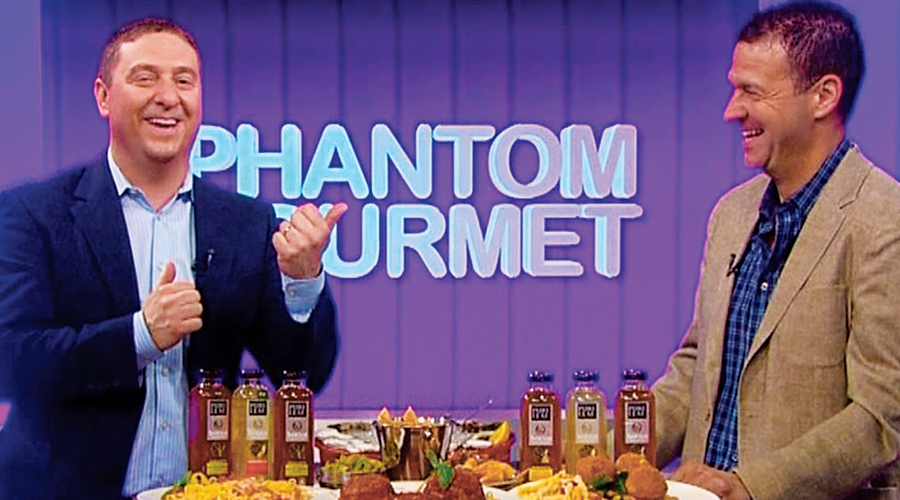
Dan (left) and Dave Andelman share a laugh during a segment of Phantom Gourmet. / Photo courtesy of Instagram
One sweltering summer afternoon in 2012, Dave and Dan found themselves standing in a crowded SoWa parking lot, waiting to get their hands on one of the buzziest dishes from one of the hottest new spots in town: a bulging pork-neck-chili-and-Frito-packed burrito from the Staff Meal food truck.
When Dave walked up to the window and politely tried to place his order, co-owner Adam Gendreau, who’d spotted the famous brothers as they waited in line, was ready for him. “Look, we can’t serve you,” he said, pointing to a sheet of laminated paper taped to the truck’s exterior, right next to the window. On the paper was a picture of the Andelmans, with the words “Do Not Serve” in large letters underneath. As SoWa’s crowd of urban gastronomes looked on, the brothers slunk away. “He really thought it was a joke,” Gendreau says. “But we were dead serious about not serving those guys.”
It wasn’t anything that happened on the Phantom television show that led Gendreau and his partner, Patrick Gilmartin, to ban the Andelmans from their food truck. In fact, Gendreau had been a fan of the show when he was a kid. It was what went on the radio and the show’s Facebook page that prompted the owners’ small rebellion.
Phantom Gourmet’s radio show aired from 2007 to 2013 on WTKK, featuring Dave, Dan, and their other brother, Mike. It was true to the family’s pedigree in the world of brash sports talk: They shot the breeze with shock-jock firebrands and fielded hot takes from listeners on food-related topics. “It was ostensibly about food,” says conservative radio personality Michael Graham, but it was really about “guys having conversations that guys have, and having it on the air: sex, rock ’n’ roll, a little politics.”
This was the platform from which the brothers would savage their perceived foes, including a hostess at Grill 23—a friend of Gendreau’s, as it happened—who reportedly told the Andelmans she could not seat them because the dining room wasn’t open yet. At the same time, Dave used the show’s official Facebook page—which today has nearly 800,000 followers, more than the Boston Globe, Chronicle, and Matty in the Morning combined—and the radio show to declare war on the city’s nascent food-truck scene, an issue that hit even closer to home for Gendreau and his business partner.
The then-ascendant foodie community was thrilled with the advent of food trucks, seeing them as a key part of a newly democratized food world order that was giving the little guys a chance to compete in a true meritocracy. The Andelmans, however, weren’t having it. They invited their buddies from the restaurant industry on the air to bash the trucks, dismissing the operators as hipsters who were cheating the system because they didn’t pay rent—and taking business away from stationary restaurants in the process. On air and on Facebook, they pushed for regulations designed to thwart the movement, including a heavy-handed requirement that trucks be at least 1,000 feet from the nearest restaurant. “These guys talk about people pulling themselves up by their bootstraps,” Gendreau says. “And you don’t bootstrap anything like you do a food-truck business. So, you know, we were always like, ‘You guys should be supporting us.’ It was almost like those guys wanted us to kiss their ring or something.” Instead, the owners of Staff Meal pasted up the sign.
The all-out war against food trucks was not the only controversy Dave embroiled himself in on his radio and social media platforms. There was also the time, in 2011, when one of the Andelmans’ advertisers, Upper Crust pizza, got into hot water for paying its workers less than minimum wage—this after being previously fined $350,000 by the U.S. Department of Labor for failing to pay overtime to undocumented employees who worked as many as 100 hours a week. Dave came out squarely in Upper Crust’s corner, not only continuing to work with the brand and taking its advertising dollars, but also personally promoting it and defending it in a move that was criticized in local media and by legions of food bloggers.
As the gulf between Phantom and Boston’s dining intelligentsia widened, those food bloggers became yet another source of ire for Dave. Newly popular food forums like Chowhound allowed amateur writers to position themselves as the authorities on where to eat and soon became a platform for posting anti-Phantom snark. Yelp, meanwhile, gave amateur reviewers new power to criticize Phantom’s favored restaurants, and, critically, its food festivals, infuriating Dave, who penned an op-ed for the Boston Herald calling for the platform to be shut down for bullying restaurants.
Still, arguing on Facebook with his foes and ranting into the void through the media were small potatoes when it came to really making a mark. After all, Dave was already winning arguments where it really counted—on Beacon Hill.
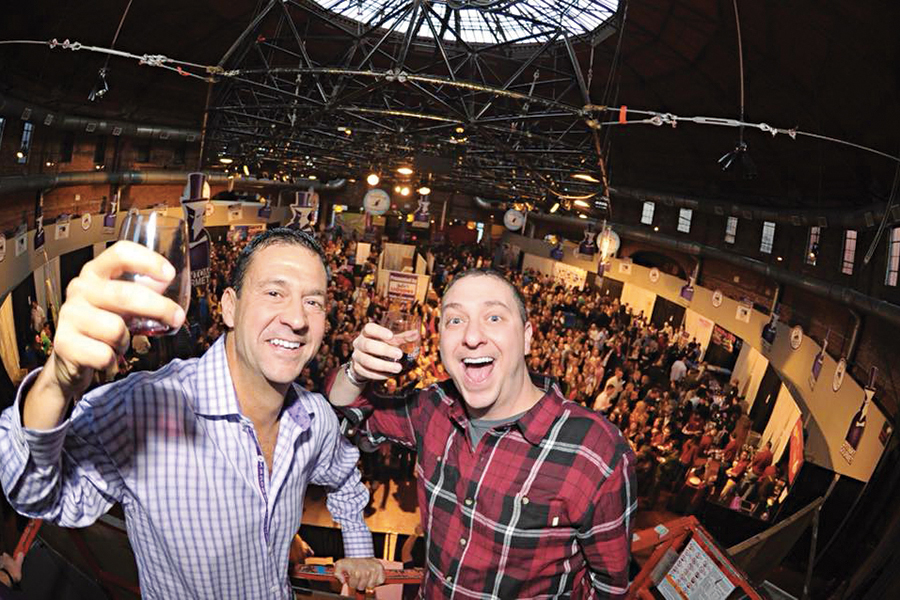
The brothers raising a glass at their Phantom Gourmet Wine & Food Phest. / Photo courtesy of Instagram
Dave’s foray into state politics started, ironically enough, during a leisurely weekend brunch. Enjoying a meal one morning in 2010 at a local restaurant, the TV personality ordered a cocktail—only to be rebuffed by his server, who explained that because of Massachusetts’ blue laws, he couldn’t have one before noon. It was a level of government intrusion he couldn’t stomach, and it was, he surmised, hitting his friends’ bottom lines.
In no time, Dave began intoning on the radio about the injustice of it all—how the deep-blue legislature was hopelessly out of touch on the issues, in the midst of a recession, no less. A regular caller named Vincent Errichetti, known on the show as “Vinny from North Reading,” was listening. Errichetti, Dave learned, had some experience dabbling in Republican politics. The two struck up a rapport and began strategizing about how to lobby the state to change the law. “[Dave] was like, ‘Well, if no one else is going to do it, I’m going to do it myself,’” a food industry veteran tells me. (Errichetti declined to comment.)
It was a popular first cause. Dave called his boozy brunch idea “The Restaurant Rejuvenation Act,” which was a pretty grandiose name for a proposed budget amendment that would simply let restaurants serve alcohol beginning at 10 a.m. instead of noon. He convinced a slew of bipartisan lawmakers to get on board, and just in time for Fourth of July weekend, the act was signed into law.
The victory was a booming testament to the weight of Dave’s celebrity, and proof that he could leverage it to further his pro-restaurant, anti-tax-and-regulation point of view. Phantom Gourmet, Massachusetts’ television program for “food and fun,” had just successfully lobbied for the passage of legislation. “People told me it would take years to get it passed,” Dave later boasted to Stuff magazine. “It took us weeks.”
Advocating for causes on Beacon Hill also made good business sense, for both the Phantom and its supporters. Dave and Errichetti founded the Restaurant and Business Alliance (RABA), and over the years, the organization amassed a roster of more than 200 dues-paying members and placed local titans such as Patrick Lyons and Anowsh Dadgar on the board.
As it turned out, there was significant overlap between the alliance’s membership and the show’s programming: One Boston food reviewer, MC Slim JB, analyzed the rolls of both and found that at least three-quarters of RABA members had advertised or been featured on the show. Together, this Phantom crew fought efforts to raise the minimum wage while pushing to strip benefits from employees caught drinking at work and to end the state ban prohibiting pharmaceutical companies from buying meals for doctors. They also lent their voice to issues beyond the dining realm, railing against a proposed one-cent-per-mile levy on cars and a 2013 proposal that would have added a sales tax to computer-design services.
To Dave, it wasn’t enough that the industry already had the powerful Massachusetts Restaurant Association, an 86-year-old lobbying group with 1,400 members, deep institutional knowledge, and long-standing relationships with legislators, fighting for it. “He always wanted to be more aggressive with the legislature. He felt we weren’t getting enough. He wanted to go further,” says DiFillippo of Davio’s. “I’d rather get something done than just keep fighting, having press conferences, and nothing happens.”
By the time the alliance fizzled in 2015 after Dave and Errichetti had a falling out, Dave found himself with more political power than ever. But with nowhere to wield it, he channeled his views back on Facebook, where his messaging took an increasingly political, sometimes crude, streak. In one post, he taunted food bloggers by boasting he could kick their ass—“typical FB tough guys,” he wrote once, “even though I could knock them out in two minutes in real life”; in another, he told a woman that if she liked Barack Obama so much she “should go down on him like a circus seal.” In other words, he knew just how to push people’s buttons on the Internet, and every day it was something new. “That was Dave’s MO. I mean, he really almost wanted to aggravate people,” says one person close to the Andelmans. “I don’t think he could control it. He was so passionate about his political views that he couldn’t help himself. It’s almost like he forgot he was running a multimillion-dollar company.”
His brothers hadn’t. Privately worried where it all might lead, “Mike would always say to him, ‘Dave, you gotta stop being so political about stuff. It’s going to get us into friggin’ trouble,’” another friend and business associate of the Andelmans tells me. Still, for years the Facebook antics amounted to little more than background noise while the Phantom train rolled along. Until, that is, Dave went completely off the rails.
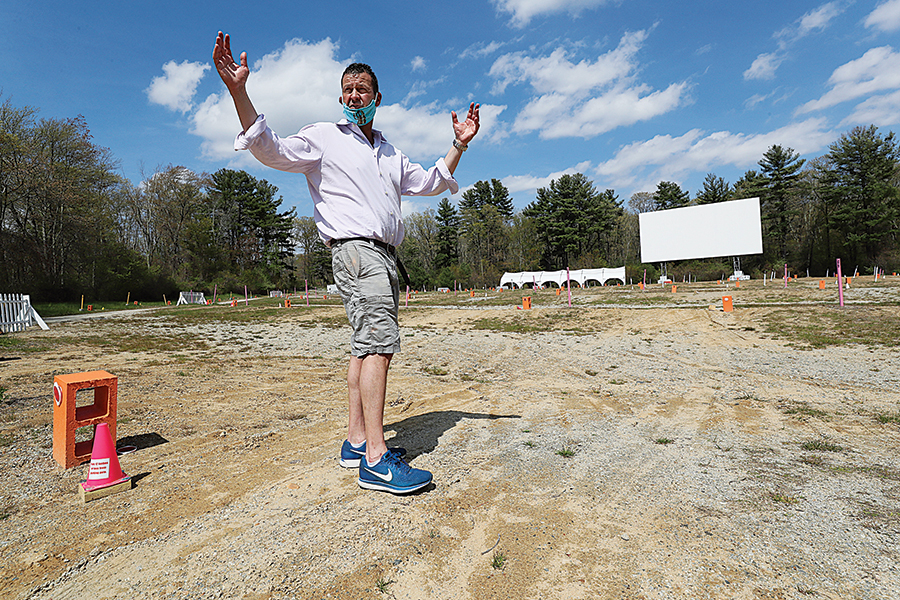
Dave getting ready for the Mendon Twin Drive-in’s re-opening this past May. / Photo by Suzanne Kreiter/The Boston Globe via Getty Images
It was April, and in any normal year, opening day for the Andelmans’ Mendon Twin Drive-In movie theater would have been right around the corner. This year, though, instead of getting ready to greet throngs of excited patrons, the place was empty and Dave was staring out at 16 idle acres of grass and mud. The fact was that for all of its charm and nostalgic allure, a drive-in theater was not, in the eyes of the state, an essential business.
These were the awkward early days of the pandemic, when the specifics of how the virus worked were still mysterious and the regulations didn’t all make sense. If the point of the shutdown was to keep people at a safe distance from one another’s droplets, why couldn’t a drive-in, with its ample room and safely spaced-out parking spots, open up for business? Dave found himself on the losing end of a questionable policy, and as the proprietor of one of the state’s three remaining drive-ins, one that came directly for his bottom line.
He quickly set the gears of Phantom World in motion, working his contacts in the restaurant industry and rallying his loyal social media foot soldiers to state his cause. He sounded off in op-eds about the unfairness of it all, posted to Facebook about the many other drive-ins opening in more enlightened states, and even wrote an open letter to Governor Charlie Baker.
When the first round of business reopenings were finally announced in May, Baker gave the nod, allowing the state’s drive-in theaters to fire up their popcorn machines once again. Dave was ecstatic. “When they said we could open, it looked like, you know when there used to be school cancellations and your brothers just run all over the house going insane? That was my brothers and I,” Dave told reporters at the time. “We were so excited.”
The Mendon Twin Drive-In was back in business at the soonest possible moment in late May, airing its first legally permitted movie at midnight to a sold-out crowd. Carloads of paying customers were once again rolling onto its vast lawn, giddy after months of lockdown. Not long after, the Andelmans were in talks with the Marshfield Fair to open another location.
Pleased with the success of his drive-in-reopening initiative, Dave once again began looking to play an even more influential role in state policy. He published an op-ed in the Boston Herald in April proposing a multi-step pandemic recovery plan, which, riffing on the name of a well-known Phantom segment, he titled the “Great 8.” Swinging for the fences, he called for waiving the meals tax and bottle deposits, eliminating scheduled minimum wage increases, and invalidating any restaurant regulations passed in the previous two years.
Legislators didn’t seem to pay much attention to it, but Dave wasn’t giving up; in fact, he aimed even higher. With the pandemic weighing heavily on Dave—a self-professed gym rat who could no longer go to his workout center, and a daily restaurant diner who couldn’t find a joint that was open—he made the most impatient and aggressive pitch of those chaotic days. In an open letter, signed by more than 100 eateries in the Phantom orbit, he asked that all restaurants, in a few weeks’ time, be permitted to “open at full capacity.” How, he asked in the letter, could Walmart and Home Depot still be in business, but restaurants could not? Virus be damned, the industry was at stake. Dave the maximalist was at it again, and he found an audience among frustrated local restaurateurs: Soon the letter had more than 250 cosigners.
Outside this echo chamber, though, there was little appetite for such an extreme approach. DiFillippo, who was tapped for the governor’s reopening board and was pushing for a more measured approach, was baffled. As a restaurateur, he would have loved to return to business as usual. But at that time, the state was seeing more than a thousand new COVID cases, and scores of deaths, each day, he says. Reopening at full capacity was nothing more than a fantasy. “It’s a pandemic! We couldn’t do that!” DiFillippo remembers thinking. “It was just silly. It was like, ‘Guys, this is not going to happen.’” And it didn’t.
Then came the slaying of George Floyd and the flood of anti-racism demonstrators in cities around the country, including Boston. Having his reopening plan rebuffed while Massachusetts permitted thousands of protesters to march shoulder to shoulder pushed Dave over the edge. In a series of ill-fated posts to his personal Facebook account, he weighed in on the state of affairs with incendiary commentary. “We don’t take a knee here. This is America, not Game of Thrones,” he wrote on Facebook. In response to photos of officers taking a knee in front of protestors, he wrote: “Your desperate need for approval, from those who hate cops and country regardless, is pathetic.” He sarcastically called for “touchless, curbside looting” in the Back Bay. If the founders knew the state was allowing protests but not restaurant dining, he wrote, “they’d jam bayonets into their own heads.”
Even worse, at least from a business perspective, was the fact that Dave’s invective was laced with food-related jokes, inadvisably linking his commentary on a touchy political subject with his food-media persona. “Defund potatoes, not police,” he wrote, along with a photo of a Summer Shack lobster roll. “I demand any of you who like breakfast potatoes or ketchup on a hot dog take a knee.”
The reaction was swift and punishing. Skilled at waging campaigns to take down powerful figures, online mobs leaped into action, pelting WBZ and Phantom advertisers with furious posts on social media. A small crowd of protesters gathered outside the Andelmans’ drive-in. Online commenters vowed to never watch the show or buy Phantom gift cards again. Restaurants who’d advertised with the show, perhaps worried the Internet masses might come for them next, vowed to cut ties. “Phantom Gourmet has taken off their mask to reveal their ugliness,” wrote one Twitter user. “Hey @WBZ,” wrote another, “you gonna cancel Phantom Gourmet? You can’t possibly continue with this disgrace of a human. Pull the plug.”
Locked in the cancel-culture vise grip, Dave did what he’d refused to do for years—he apologized. “I made a mistake. I apologize. I feel terrible. We all make mistakes. And I ask for your forgiveness,” he wrote on Phantom Gourmet’s official Facebook page. But it was too late. The Marshfield Fair had already cut ties, vowing in a statement to have “no affiliation” with Dave or Phantom, officially sinking his plan to add a second drive-in to his portfolio. Then the once unthinkable happened: WBZ put Phantom on indefinite hiatus. A rock-solid New England institution for nearly 30 years seemed to be crumbling at warp speed. “I think he considered himself an untouchable, where he could do whatever he wanted to, and because he had such a successful business, it couldn’t hurt him,” food writer Marc Hurwitz tells me. “And of course, he found out the hard way that it could.”
As the ambient hum of traffic wafted in from Columbus Avenue on a hot, late-August afternoon, a smartphone hovered over the spread: St. Louis spare ribs with baked mac ’n’ cheese and corn muffins; jerk barbecue pulled pork with fried pickles; and, of course, lemon-pepper crusted catfish. It was all plated more or less as it has always been done at Darryl’s Corner Bar & Kitchen, a soul-food staple that has served generations of Black Bostonians since it was first known as Bob the Chef’s in the 1950s.
Then the camera, broadcasting in real time on Facebook Live, pulled back to reveal Dan Andelman—Phantom Gourmet’s longtime host and now its newly christened CEO—seated at a picnic table on Darryl’s patio. At the opposite end of the table was Nia Grace, Darryl’s owner, a carafe of sangria and a bottle of hand sanitizer between them. “We are at the intersection of friends, food, and music,” Dan said, “and I am in the mood for comfort food and soul food.”
Months into Phantom Gourmet’s hiatus, alerts had been going out to the show’s Facebook followers about a series of livestreamed scenes just like this one. Here was a sun-soaked Dan in Fields Corner, plunging a fork into Cajun-spiced shrimp-and-grits at Anthony Caldwell’s 50Kitchen. There he was dunking a wad of fufu into a Nigerian stew at Suya Joint in Roxbury. In time, a pattern began to emerge in these five- or six-minute clips: Again, and again, there were Black restaurant owners at Dan’s side, and frank discussions about race were on the menu.
From his corner of Darryl’s patio, he introduced Grace, who helped found the Boston Black Hospitality Coalition earlier this year. “She’s a new restaurateur and at a challenging time to be a restaurateur, and honestly, especially challenging time to be a Black-owned restaurant, I think, in the city of Boston,” Dan said. “Talk a little bit about what the coalition is doing and some of the challenges you’ve had to face.”
After a conversation about the unique roadblocks to recovery for Black- and brown-owned restaurants and how people ought to support them in this time of need, and a little talk about the size of the bacon slabs in the baked beans, the good-natured host signed off the way he always had during his long tenure as the company’s public face: “Food and fun, that’s all we serve.”
In his newfound quest to promote diversity on the show, Dan appears to be seeking redemption for his brother’s public sins, working the phones, reaching out to restaurateurs and community leaders for advice, and putting it into action. “Dan indicated to me that it was important to him to be a voice for those neighborhoods. And that he saw a lot of good in being able to champion those causes,” says Boston chef Avi Shemtov, the owner of the Chubby Chickpea and Simcha, who tells me Dan has been asking about restaurants owned by people of color who could use some Phantom firepower to get back on their feet. “He was like, ‘Hey, do you know anybody that deserves to be highlighted? Pass them our way. We’ll do it.’”
Grace says she was wary at first of Phantom’s advances, but when Dan invited her to a Zoom call this summer, she took it, and didn’t pull any punches. “We sit here on a weekly basis watching your television show and we don’t see enough representation,” she told him. “So there’s no elephant in the room, we know why you’re here. I saw the very well-scripted apology that was posted to Facebook. When that apology came out, I was still not convinced. I wanted to see some action.”
In the end, Grace agreed to help, linking Dan with members of her coalition and urging fellow Black restaurateurs in the city to take his calls. Despite her reservations, she believes in Dan and his efforts to rebuild Phantom Gourmet. “We’re a community,” she tells me, “and if someone in our community falls, and they recognize this fall, that they’re in error, and if they’re actually saying, ‘We want to help,’ isn’t that something we should participate in?”
A few days after the Darryl’s visit, and with exactly zero fanfare or forewarning, WBZ reintroduced Phantom to its weekend lineup for the first time in two months. Then, on Saturday morning, there it was again—except now Phantom had added a new promotional segment to the show: a short clip urging support for Grace’s coalition and Black-owned businesses. The show, Dan said in the statement to Boston magazine, was proud of recently showcasing “dozens of minority-owned restaurants throughout Greater Boston, garnering over 5 million impressions on TV and online, which has resulted in new customers for them.” Phantom has also enlisted help from activist and former mayoral candidate Tito Jackson, who will spearhead executive coaching on race, oversee an effort to diversify the staff, and, as he put it in an interview with the show’s home station, make sure Phantom “is a reflection of the folks that are in the community.”
In a way, what Dan is doing without saying so is coming clean: He’s openly recognizing that on the Phantom, food is, and always has been, a political exercise. Now that the mask is finally off, we’ll all get to see for ourselves whether Phantom’s extreme makeover is more than just cosmetic.
